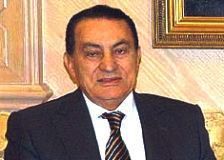Egytians vote for president
Sept 7, 2005 (CAIRO) — Egyptians voted in their first presidential election on Wednesday but President Hosni Mubarak’s most prominent rival said widespread abuses undermined the credibility of the vote, which Mubarak is expected to win.
 Ballot counting started when polling stations closed at 10 p.m. (8:00 p.m. British Time) after 14 hours of voting. The result could take three days to prepare, election official Osama Atawia said.
Ballot counting started when polling stations closed at 10 p.m. (8:00 p.m. British Time) after 14 hours of voting. The result could take three days to prepare, election official Osama Atawia said.
Turnout was low as voters chose between Mubarak and his nine rivals, most of them little-known leaders of political parties with few members, monitoring groups said.
They reported ballot stuffing, vote buying, intimidation, abuse of government vehicles and discrimination to favour Mubarak. Cairo said problems were few and turnout high.
Several hundred demonstrators gathered in central Cairo to call for an election boycott but plainclothes men broke up the protest and beat up some of the activists. The government had banned demonstrations on Wednesday.
Mubarak, 77, has won office four times since 1981 through referendums in which he was the single candidate, chosen by a parliament the ruling National Democratic Party dominates.
He changed the system this year after the United States and Egyptian protest groups pressed for reform and he has promised more political changes if he stays in office six more years.
But the election rules excluded Egypt’s largest opposition group, the moderate Islamist Muslim Brotherhood, because the government has never let it form a political party.
The election enlivened debate after decades of stagnation and brought criticism of Mubarak almost unthinkable a year ago. But the power structure remains the same and the opposition say they doubt Mubarak wants real political change.
Mubarak is expected to win by a comfortable majority, partly because of his long experience in office and his control of the state. He is widely admired for keeping Egypt out of war.
VOTE-BUYING ALLEGATION
“This is not an election. They are treating this as another referendum. The government has lied (about a fair vote),” said Ghad (Tomorrow) Party leader Ayman Nour, one of the main rivals.
Nour, a liberal, told a news conference that the ruling party and municipality officials were paying people either 20 or 50 pounds to vote and that the ink used on people’s fingers to prevent them voting again was not indelible.
“They (the authorities) are exposing Egypt to destructive danger for the sake of these petty acts,” he added.
The Egyptian Organisation for Human Rights, the main independent rights group, also alleged vote buying. It was not possible to corroborate the reports.
Information Minister Anas el-Feki said there may been some abuses. “But you must agree we are dealing with an experiment that we can build upon for the future, God willing, to realise more freedom and democracy,” he told a news conference.
The Sawasya Centre for Human Rights said its monitors saw ruling party organisers filling out and handing in 800 of the 1,248 ballot papers in the Nile Delta village of Samla. Three hundred people had voted by then, said a Sawasya official.
The Wafd Party, which fielded party leader Noman Gomaa, said its delegates were excluded from polling stations in Port Said, northeast of Cairo, and Assiut and Sohag to the south. At many polling stations, witnesses said delegates for Mubarak’s National Democratic Party (NDP) were the only ones present.
WASHINGTON SAYS “HISTORIC”
But Ahmed Fahmi of the independent National Campaign for Monitoring the Elections said: “There are no big violations but little problems everywhere. It’s better than I expected. The main problem is that people are not voting. People are very ignorant so they pay them money to vote.”
The Presidential Election Committee, running the elections, does not answer specific allegations.
The United States, which says it wants democracy in the Middle East, said the voting was historic but it was concerned about reports of harassment and violence against protesters.
“What we look forward to is the Egyptian government and the Egyptian people building on the progress that has been made in this election,” State Department spokesman Sean McCormack said.
Turnout estimates varied even in the same place. At one station in Cairo, the presiding judge said it was 4 percent but NDP official Amani Wahba said it was 80 percent. In some previous Egyptian elections and referendums, less than 10 percent of people have voted, judges and rights groups said.
A random inspection of several hundred hands in the streets of central Cairo found ink visible on only one.
Nour manager Wael Nawara said the turnout was between 15 and 20 percent in rural areas; 3 to 5 percent in towns.
Many Egyptians are not registered and some have dismissed the presidential election as a show for foreign consumption.
(Additional reporting by Edmund Blair, Tom Perry in Cairo, Mohammed Abbas in Fayoum and Camilla Hall in the Delta)
(Reuters)
